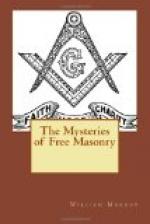The Master then produces the same keystone, concerning which so much has already been said, and says to the candidate, “We read in a passage of Scripture—Rev. II 17 ’To him that overcometh will I give to each of the hidden manna, and will give him a white stone, and in the stone a new name written, which no man knoweth save him that receiveth it’” He then presents the stone to the candidate and says, ’I now present you with a white stone, on which is written a new name; we give the words that form this circle (the letters are so engraved on the stone as to form a circle), the initials are H T W S S T K S—Hiram Tyran, Widow’s Son, sent to King Solomon. These, placed in this form were the mark of our Grand Master, Hiram Abiff. At present they are used as the general mark of this degree, and in the centre of them each brother places his own individual mark.’ The stone is removed, and the candidate still remains on his knees at the altar, the Master then takes the jewel containing his mark from his neck and presents it to the candidate—requests of him some favor, such as the loan of five, ten, or twenty dollars. The candidate having left all his money and valuables in the preparation room, answers, “I cannot do it. I have no money about me,” and offers to return the mark to the Master, but he refuses to take it, and says to the candidate, “Have you not just sworn that you will receive a brother Mark Master’s mark when offered to you, requesting a favor, and if not in your power to grant the favor, you would return him his mark with the value of it? Is this the way you mind your obligations? Here I presented my mark with a request for a small favor; you say you cannot grant it, and offer to return my mark alone? Where is the quarter of a dollar you have sworn to return with it?” The candidate, much embarrassed, answers, “I cannot do even that. I have no money about me. It was all taken from me in the preparation room.” The Master asks, “Are you quite sure you have none?” Candidate answers, “I am, it is all in the other room.” Master—“You have not examined; perhaps some friend has, in pity to your destitute situation, supplied you with that amount unknown to yourself; feel in all your pockets, and if you find, after a thorough search, that you have really none, we shall have less reason to think that you meant wilfully to violate your obligation.” The candidate examines his pockets and finds a quarter of a dollar, which some brother had slyly placed there; this adds not a little to his embarrassment; he protests he had no intention of concealing it; really supposed he had none about him, and hands it to the Master, with his mark. The Master receives it and says to the candidate, “Brother, let this scene be a striking lesson to you: should you ever hereafter have a mark presented you by a worthy brother, asking a favor, before you deny him make diligent search, and be quite sure of your inability to serve him;




